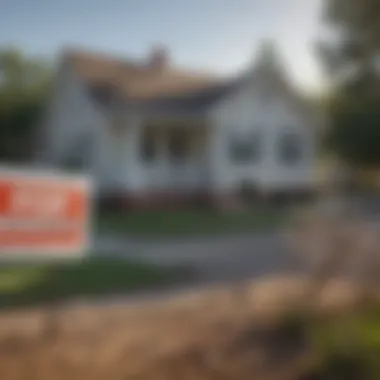Navigating VA Loan Eligibility Post-Foreclosure


Intro
Navigating the financial landscape can be challenging, especially after experiencing a foreclosure. For veterans and active-duty service members, understanding the implications of foreclosure on VA loan eligibility is crucial. This article provides a detailed exploration of the criteria for obtaining a VA loan following a foreclosure. We will delve into the mandated waiting periods, steps to enhance the chances of loan approval, and significant considerations for potential borrowers.
Investment Terminology
Understanding key terms related to VA loans and foreclosure can aid in navigating the complexities of the process. Here are some essential definitions:
Key Terms and Definitions
- VA Loan: A mortgage backed by the U.S. Department of Veterans Affairs, designed to offer veterans favorable borrowing terms.
- Foreclosure: The legal process in which a lender takes possession of a property when the borrower fails to meet loan obligations.
- Waiting Period: The time frame a borrower must wait after a foreclosure before being eligible for a new loan.
- Modification: A change made to the terms of an existing loan, often to make repayment easier for the borrower.
Common Acronyms in Finance
- VA: Veterans Affairs
- FICO: Fair Isaac Corporation, related to credit scores
- LTV: Loan to Value ratio, a measure of risk in lending
- DTI: Debt to Income ratio, helps lenders assess a borrower's ability to manage monthly payments.
After a foreclosure, it is essential to comprehend how this event affects loan eligibility and what steps can be taken to regain financial footing. The VA has specific guidelines regarding waiting periods and overall eligibility after such events.
The typical waiting period following foreclosure is two years. However, this duration can be reduced under certain circumstances. By understanding these waiting periods and demonstrating a solid financial history post-foreclosure, veterans can improve their chances of securing a VA loan. Before applying, consider the following:
- Verify your credit score. A higher score can significantly impact loan eligibility.
- Gather necessary documentation. This includes bank statements, tax returns, and proof of income, which can help lenders evaluate financial stability.
- Establish a budget and savings. Aim to demonstrate capability to meet future mortgage payments.
Expert Insights
Veterans seeking to regain access to VA loans must focus on strategic planning and informed decision-making. Here are some expert insights to consider:
Investment Strategies Overview
- Emergency Fund: Ensure you have savings set aside to cover unexpected expenses.
- Diversification: Explore various investments to mitigate risks associated with housing market fluctuations.
- Credit Building: Use secured credit cards responsibly to rebuild credit.
Tips from Financial Advisors
- Consistent communication with lenders can clarify guidelines and available options.
- Engage with financial counseling services, especially those tailored for veterans.
- Monitor changes in VA loan policies, as these may affect eligibility criteria.
"The pathway to regaining financial stability after foreclosure requires diligent planning and a thorough understanding of your borrowing options."
In summary, while foreclosure does present challenges, it is not an insurmountable obstacle to obtaining a VA loan. By implementing effective strategies and being aware of the relevant guidelines, veterans can forge a path towards homeownership once again.
Understanding VA Loans
Understanding VA loans is crucial for veterans and active-duty service members who are considering homeownership, especially post-foreclosure. These loans offer distinctive advantages that cater specifically to the needs of those who have served in the military. A clear grasp of what VA loans encompass can empower these individuals to make informed financial decisions, particularly after experiencing a foreclosure.
Definition of VA Loans
VA loans, or Veterans Affairs loans, are mortgage options backed by the U.S. Department of Veterans Affairs. They are designed to help veterans, active-duty military personnel, and certain members of the National Guard and Reserves acquire homes without the traditional financial burdens associated with home loans. These loans typically do not require a down payment, nor do they necessitate private mortgage insurance (PMI). With more favorable terms than conventional loans, VA loans aim to facilitate home ownership for those who have served the nation.
Benefits of VA Loans
VA loans present several key benefits, making them a favorable choice for eligible individuals:
- No Down Payment Requirement: Eligible borrowers can purchase a home without needing to save a substantial amount for a down payment, which is often a significant barrier for many prospective buyers.
- Competitive Interest Rates: Generally, VA loans offer lower interest rates compared to conventional loans, which can mean lower monthly payments and overall savings over time.
- No PMI: Unlike traditional loans that require private mortgage insurance when the down payment is low, VA loans do not have this requirement. This can lead to considerable savings, as PMI can be a substantial monthly expense.
- Assumable Loans: VA loans can be assumed by future buyers, which could be an attractive feature if the homeowner decides to sell in the future. This allows the new buyer to inherit the advantageous loan terms.
- Flexible Credit Requirements: While credit requirements vary, VA loans are often more accessible for those with less-than-perfect credit compared to conventional loans.
In summary, understanding the features and benefits of VA loans not only reaffirms their importance but also provides veterans and service members with insight into their options in the housing market after foreclosure. By leveraging these loans, they can navigate their financial futures with greater confidence.
Foreclosure and Its Impact on Homeownership


Understanding the implications of foreclosure is crucial, especially when considering future borrowing opportunities such as VA loans. Foreclosure does not only affect the immediate financial standing but also the long-term prospects of homeownership. For veterans and service members, who often have unique situations in terms of benefits and eligibility, knowing the extent of these impacts is vital to navigating the complex landscape of VA loans post-foreclosure.
Definition of Foreclosure
Foreclosure is a legal process through which a lender attempts to recover the balance of a loan from a borrower who has stopped making payments. In simpler terms, when someone fails to pay their mortgage, the lender can take steps to sell the property to recover the owed amount. This process can lead to significant loss for homeowners, as they can lose their homes, their investment in property, and even their credit standing.
Financial Consequences of Foreclosure
The financial impacts of foreclosure can be severe and long-lasting. Typically, a foreclosure can significantly damage credit scores, often resulting in a drop of 100 points or more. This major credit score decline impacts the ability to secure future loans, including VA loans. The following points outline some of the key financial consequences:
- Credit Score Decline: A foreclosure remains on a credit report for up to seven years, affecting future lending opportunities.
- Increased Interest Rates: Even if a borrower qualifies for another loan, they may face much higher interest rates due to their perceived risk by lenders.
- Financial Strain: Additional costs, such as late fees or legal fees during the foreclosure process, can further compound the financial burden already faced by former homeowners.
Emotional and Psychological Impacts
The emotional toll from losing a home through foreclosure can be profound. Homeownership often carries a weight of pride, security, and stability. Therefore, when families face foreclosure, it can lead to:
- Feelings of Loss: Many individuals experience significant grief over the loss of their home, which can lead to longer-term emotional distress.
- Stress and Anxiety: Financial uncertainties can cause ongoing stress that affects personal relationships and overall mental health.
- Stigma and Isolation: Society often holds a stigma against individuals who have gone through foreclosure, leading to feelings of isolation or shame.
"Consulting with financial advisors post-foreclosure to understand options can be an important step in recovery."
Understanding these implications can help veterans and other homeowners better prepare for future homeownership opportunities, including potential VA loan eligibility.
VA Loan Eligibility Criteria
Understanding the eligibility criteria for VA loans is essential in the context of post-foreclosure situations. For many veterans, these loans provide an avenue to homeownership with numerous benefits including no down payment and favorable interest rates. However, navigating eligibility can be complex, particularly for those who have faced foreclosure. A thorough grasp of these criteria not only illuminates the path back to homeownership but also emphasizes the vital role of credit, debt-to-income ratios, and other financial factors.
Basic Eligibility Requirements
To qualify for a VA loan, certain fundamental criteria must be met. These include:
- Service Requirements: You must be a current member or veteran of the U.S. military, or a member of certain reserves or National Guard units. Documentation like the DD214 form may be required to verify your service.
- Credit Requirements: Generally, VA loans do not have a strict minimum credit score, but lenders might look for scores above 620. A good credit history reflects responsible borrowing behavior.
- Income Verification: Steady and reliable income is crucial. Lenders assess your ability to repay the loan based on employment history and income stability.
- Debt-to-Income Ratio: This ratio measures your monthly debt payments against your gross monthly income. A ratio below 41% is often seen as favorable, although exceptions exist.
Understanding these basic requirements equips prospective borrowers to assess their standing before applying for a VA loan.
Impact of Foreclosure on Eligibility
Foreclosure can significantly complicate the VA loan eligibility unwinding process. While the VA does not impose a specific waiting period for obtaining a new loan after foreclosure, private lenders often do.
- Standard Waiting Period: Typically, lenders may require a waiting period of two years post-foreclosure before you can qualify for another VA loan. This rule, however, can vary.
- Credit Score Reduction: Foreclosure usually leads to a marked dip in credit scores, affecting your ability to secure favorable loan terms. This requires borrowers to focus on rebuilding credit.
- Potential for Exceptions: In certain situations, such as loss of home due to circumstances beyond the veteran's control, exceptions to waiting periods may exist. Lenders may offer flexibility evaluated through a detailed review of your financial situation.
Considering the impact of a foreclosure is crucial. Preparing before applying for a VA loan can ease the transition back to homeownership. Knowledge of requirements and the influence of past financial challenges assists in setting realistic expectations.
"The road to securing a VA loan post-foreclosure may be challenging, but with the right understanding and preparation, it becomes a manageable endeavor."
In summary, having a well-rounded understanding of VA loan eligibility and the additional challenges posed after foreclosure is vital. Borrowers can assess their situation and take appropriate steps needed for the future.
Waiting Periods After Foreclosure
Waiting periods after foreclosure play a crucial role in assessing eligibility for a VA loan. Understanding the duration and implications of these waiting periods can greatly affect veterans and service members who seek to rebuild their lives and regain homeownership. The waiting period is primarily designed to allow time for financial recovery, ensuring the applicant is ready and stable before taking on new debt.
Overview of Waiting Periods
The VA establishes specific waiting periods that potential borrowers must observe after foreclosure. Typically, the waiting period is two years following the date of the foreclosure. This time frame serves as a buffer for individuals to improve their financial situations and rebuild their credit scores. It is essential for prospective borrowers to use this period wisely by addressing any outstanding debts and creating a sustainable budget to demonstrate financial stability.
During this waiting period, one beneficial aspect is the opportunity to take steps that can positively influence the future loan application. Engaging in credit counseling, establishing a steady income, and making timely payments on any current financial obligations are all crucial actions that can enhance an individual’s credit profile, thereby improving their chances of approval once the waiting period expires.


Variations Based on Circumstances
The two-year waiting period is generally applicable, but there can be variations depending on individual circumstances. Factors such as the type of foreclosure, the cause of the financial hardship, and specific items on a person’s credit report may alter the waiting period.
- Type of Foreclosure: Depending on whether the foreclosure was voluntary or involuntary, the waiting period may be influenced. Voluntary foreclosures might allow for some leniency based on the individual’s circumstances.
- Severity of Financial Hardship: Situations such as job loss or medical emergencies could be considered when determining eligibility. Documentation showing these hardships may support a case for a shorter waiting period.
- Credit Recovery: If an applicant is able to show substantial credit recovery and a solid financial plan during the waiting period, exceptions could potentially apply.
It's advisable to consult with a VA loan specialist or a mortgage expert to evaluate specific situations. This approach ensures that all personal factors are acknowledged and considered before reapplying for a VA loan.
"Understanding and preparing for the waiting period after foreclosure can lead to better financial decisions, ultimately fostering successful home ownership within the VA loan framework."
By being informed of the waiting periods and considering variations based on personal circumstances, veterans and service members can navigate their paths toward homeownership more effectively.
Preparing to Apply for a VA Loan
Applying for a VA loan is an important step for many veterans and service members, especially after experiencing a foreclosure. Understanding the application process is crucial for ensuring that all necessary steps are taken and enhancing the chances of obtaining approval. The preparation phase involves assessing financial health and gathering the right documents, both of which are essential for a successful application.
Assessing Financial Health
Before applying for a VA loan, it is vital to conduct a comprehensive assessment of your financial health. This includes reviewing your credit score, income sources, and overall financial stability.
A good credit score is generally favorable when seeking any type of loan, including a VA loan. Veterans should aim for a score that is above 620, although specific lenders may have different requirements. Regularly checking your credit report is necessary to identify any inaccuracies or unresolved issues that could affect your application.
Ehxausting your funds or relying on credit cards can lead to financial instability, so maintaining a balanced budget is wise. You may need to lower your debt-to-income ratio. This is especially important after a foreclosure, as it may have affected your overall creditworthiness. Potential applicants should also consider additional income streams or part-time work to strengthen their financial profile.
Gathering Necessary Documentation
Collecting the necessary documentation facilitates a smoother application process. Prospective borrowers must be organized and have relevant paperwork readily available.
The essential documents typically include:
- Certificate of Eligibility: This verifies your entitlement to a VA loan. It can be requested through the VA's eBenefits portal.
- Proof of Income: Recent pay stubs, W-2 forms, or tax returns help in demonstrating your income stability.
- Credit Report: If you have already obtained one from a credit reporting agency, you may submit this to your lender.
- Employment Verification: A letter from your employer confirming your position and income aligns with the requirements.
- Additional Financial Documentation: Bank statements and records of other assets may need to be provided.
Collecting your documents early not only minimizes stress but also helps in correctly filling out your application.
It's detrimental to wait until the last minute to assemble these materials. Lastly, keeping a copy of everything submitted can be useful for future reference, especially if questions arise regarding your application.
Improving Chances of VA Loan Approval
Improving one's chances of securing a VA loan after a foreclosure is a critical topic for veterans and service members. Understanding the steps to enhance approval prospects is essential, particularly when the road to homeownership seems daunting after financial setbacks. The VA loan program is specifically designed to support those who have served in the military, providing favorable terms and conditions. However, a past foreclosure can complicate the journey. Therefore, knowing how to rectify financial standing is vital for a successful application.
Rebuilding Credit Score
A major factor in loan approval is the credit score. A strong credit score reflects responsible financial behavior and is vital in assessing the risk for lenders. After a foreclosure, restoring one’s credit score should be a priority.
- Review Credit Report: The first step is to obtain and review the credit report. Errors and inaccuracies often mar credit reports. Addressing these issues can positively influence overall scores.
- Timely Payments: Ensuring all current debts are paid on time is crucial. Late payments can further inhibit improvement of the credit score.
- Debt Management: It may be beneficial to explore ways of managing existing debts more efficiently. This include prioritizing high-interest debts or utilizing consolidation loans where applicable.
- Credit Utilization: Maintaining a low credit utilization ratio—ideally below 30%—is also vital. This ratio measures the amount of credit used compared to the total available credit. Minimizing this can lead to score improvements.
In essence, rebuilding a credit score takes time and diligence, but the rewards are significant in the context of loan eligibility.
Exploring Co-borrowing Options
Another effective strategy is exploring co-borrowing options. A co-borrower can significantly impact the likelihood of obtaining a VA loan post-foreclosure. Having a co-borrower may strengthen the application through combined income and improved credit profiles.
- Enhanced Financial Stability: A co-borrower with a good credit history can clarify existing financial uncertainties. This balance may serve as reassurance for lenders.
- Joint Responsibility: The liabilities are shared between co-borrowers, allowing for a more manageable debt situation. This arrangement can lead to lower monthly payments compared to a sole borrower situation.
- Larger Applications: Utilizing a co-borrower can also increase the loan limit possibilities, offering more options in terms of property value.
- Increased Approvals: Lenders generally view applications with co-borrowers more favorably, especially when one has a stronger financial background.
It is important to note that both parties are equally responsible for the loan. Thus, thorough discussions about financial commitments are necessary before proceeding with co-borrowing.
"Rebuilding credit and considering co-borrowing options can open doors for veterans post-foreclosure."
The Role of VA Loan Specialists


VA loan specialists play a crucial role in assisting veterans and service members navigating the complexities of VA loans, especially after experiencing foreclosure. Their expertise is particularly valuable for individuals who may feel overwhelmed or uncertain about their options. By providing tailored guidance, VA loan specialists help demystify the borrowing process and clarify entitlements that veterans may utilize after a foreclosure.
One significant aspect of their involvement is the ability to evaluate unique financial circumstances. Each veteran's service history, combined with personal financial conditions, can vastly influence loan eligibility.
Benefits of Consulting a Specialist
Consulting a VA loan specialist comes with several distinct advantages:
- Personalized Guidance: Specialists offer tailored recommendations based on specific financial situations and loan eligibility requirements.
- Navigational Expertise: They possess a deep understanding of the VA loan process, including eligibility criteria, waiting periods, and necessary documentation.
- Access to Resources: Specialists often have access to tools and resources that can streamline the application process, saving time and reducing stress.
- Understanding of Market Trends: They stay informed about the housing market, helping veterans identify favorable lending conditions to their advantage.
Consulting a specialist is a valuable step towards ensuring successful navigation of the VA loan process post-foreclosure.
How Specialists Can Assist with Overcoming Foreclosure Barriers
Foreclosure can impose significant barriers to obtaining a VA loan, but specialists can help overcome these challenges by:
- Clarifying the Waiting Period: They can explain how the waiting periods work and help veterans understand when they can reapply for eligibility.
- Credit Repair Guidance: Specialists can offer advice on rebuilding credit scores that may have been affected by foreclosure, enhancing the chances for loan approval.
- Exploring Co-borrowing Options: They can discuss potential co-borrower solutions if the veteran requires additional income or credit support.
- Advocating During the Application Process: Experienced specialists have the skills to advocate for their clients, presenting the veteran’s history positively and emphasizing their commitment to responsible homeownership after foreclosure.
Engagement with a VA loan specialist can provide veterans the needed edge to navigate back into homeownership successfully and with confidence.
Key Considerations for Veterans and Service Members
Understanding Military Benefits
Military personnel have access to benefits that civilian borrowers do not. These benefits play a crucial role in shaping eligibility and loan terms. For example, VA loans do not require mortgage insurance, which can lower monthly payments. In addition, qualifying veterans can borrow up to the full loan amount without a down payment, making homeownership more accessible.
Veterans may also qualify for special assistance programs aimed at helping those who have faced financial hardship, including foreclosure. These programs often provide resources for rebuilding credit and managing debt. Knowing how to leverage these benefits can make a difference in navigating the complex VA loan process.
Navigating Eligibility for Reservists
Reservists may find themselves in a unique position concerning VA loans. Their eligibility can depend on their activation status and service time. It is important to understand how these factors influence access to benefits.
Reservists must meet certain service requirements to qualify for VA loans. These are different from those of active-duty service members or veterans. In many cases, they need to demonstrate that they have been called to active duty for at least 90 days. This can complicate situations, especially for those who have gone through foreclosure.
Common Myths About VA Loans Post-Foreclosure
Understanding the myths surrounding VA loans after a foreclosure is vital. Many people believe falsehoods that can severely impact their ability to secure financing. This section debunks prevalent misconceptions, clarifies facts, and ultimately guides veterans and active-duty service members through what can be a complicated lending landscape. Knowing the truth about these myths helps applicants make informed decisions, avoiding unnecessary pitfalls in the long process of applying for a VA loan after experiencing foreclosure.
Debunking Misconceptions
A number of myths circulate regarding VA loans and foreclosure. Some veterans think that once a foreclosure occurs, they become permanently ineligible for VA financing. This is incorrect. The VA does not blacklist borrowers for life after a foreclosure. Instead, certain waiting periods apply, which depend on the circumstances surrounding the foreclosure. Understanding that eligibility can be regained with time helps applicants focus on rebuilding their finances rather than feeling hopeless about their situation.
Another common misconception is the belief that VA loans require a perfect credit score. While maintaining a good credit score is beneficial, the VA does not impose strict credit score criteria. Instead, they assess the entire financial picture of the applicant. This can include debt-to-income ratios, payment history, and alternative credit sources. Being realistic about credit can open up options for many individuals who wrongly assume they are disqualified.
Clarifying Facts Versus Fiction
Many veterans are unaware of the specific requirements for securing a VA loan post-foreclosure. For instance, some think that the waiting period after foreclosure is five years. In truth, the VA mandates a two-year waiting period for most cases, although exceptions may apply in certain scenarios. It's essential potential borrowers understand these factors.
When researching VA loans, some explore rumors that they are only accessible for first-time homebuyers. This is not accurate. Veterans can access VA loans multiple times throughout their lives, as long as they have remaining entitlement and meet eligibility criteria. This fact underscores the value of VA loans as a flexible option for veterans needing loans even after pastfinancial missteps.
"Misunderstandings about VA loans can delay recovery for many veterans. It's crucial to separate fact from fiction in this realm."
End
Recap of Main Points
- Definition of Foreclosure: Foreclosure represents a legal process where a lender attempts to recover the balance of a loan from a borrower who has stopped making payments. This negatively affects one's credit profile.
- Impact on VA Loan Eligibility: The Veterans Administration has set specific waiting periods post-foreclosure which can vary depending on individual financial circumstances. Generally, the waiting period is around two years for a VA loan, but certain conditions can alter this timeframe.
- Key Preparation Steps: Improving credit and gathering proper documentation is necessary to enhance chances of approval. This enables applicants to present a well-rounded application.
- Role of Specialists: Consultation with VA loan specialists can significantly help overcome barriers related to foreclosure. They can provide personalized guidance based on recent financial history.
- Myths and Misconceptions: Clarifying common myths surrounding VA loans can empower veterans to pursue homeownership without undue apprehension.
Final Thoughts on VA Loan Applications After Foreclosure
Reapplying for a VA loan after experiencing foreclosure demands a proactive approach. It is essential for applicants to address their financial health meticulously. Rebuilding credit scores and understanding eligibility requirements are pivotal actions towards homeownership restoration. By demystifying the process and addressing prevalent misconceptions, veterans and service members can take assured steps in securing a VA loan despite past financial adversities. Being informed serves as the foundation for making prudent decisions regarding future investments in real estate.















